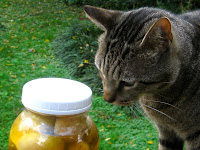Here at DogTown Lounge, we're always looking for ways to reduce our impact on the environment, while maintaining the highest levels of safety and hygiene.
Hypoallergenic solutions are always a bonus, so it was intriguing to find some highly effective recipes for cleaning supplies using simple, pure, common household ingredients. We've replaced nearly all our cleaning materials with varying strengths and combinations of white vinegar, lemon peels, baking soda and soap. Here are a few of the ones we use daily:
Basic All-Purpose Cleaner
Large clean glass jar with secure lid.
Lemon or lime peels enough to fill jar.
White Vinegar
Fill the jar with the citrus peels, then pour in white vinegar up to the top, put the lid on it and give it a good shake. Set in the sun on a porch or windowsill for about two weeks, drain off the liquid and toss the citrus peels in the compost pile. Filter citrus-infused vinegar through coffee filters to make sure it sprays evenly and mix 50% with water in a clean spray bottle for a fresh-smelling and effective cleaning spray. Use to replace glass cleaners or surface anti-bacterial cleaners. Full strength for floors and tough stains. Test before using on painted surfaces.
Citrus Enzyme Cleaning Fluid
2-liter plastic bottle or gallon glass jar
1/2 cup Brown Sugar
1 liter Water
2 cups lemon, lime or orange peels
Chop up citrus peels to fit into the bottle you've chosen - I used a 2 liter bottle once, and ran the citrus through the blender, worked great but needed to be filtered twice before it would work well in a spray bottle. Pour citrus peels, brown sugar and water into the bottle, cap it and shake well. This will take 3 months to ferment properly, during which time you should loosen the cap every few days to release the expanding gases, and shake it up again. You can shorten this whole process down to two weeks by adding a teaspoon of fresh yeast to the mix, but the fermentation will happen quickly so it's much more important to release the vapors daily to keep the bottle from cracking.
Strain through cheesecloth and use full strength, 1/4 cup for laundry or dishwasher loads, clearing drains, scrubbing stained linoleum or tile floors, toilets or stubborn appliance stains. 10% solution for cleaning bathrooms and kitchens, 5% for vegetables or fruits. Pour the mop water over vegetable beds to fertilize, protect against some insects and repel cats - who generally dislike citrus.
Scrubbing Powder
Quart jar, yoghurt container, etc.
Quart jar, yoghurt container, etc.
2 cups of baking soda
1/2 cup salt
1/2 cup borax
1/2 cup salt
1/2 cup borax
Mix together thoroughly and use as you would any brand name sink and tile scrubbing powder. This mixture smells clean and fresh, but you could also add a few drops of your favorite essential oil such as rosemary, clove, cinnamon or eucalyptus.
I hope these give you some ideas about less-toxic alternatives to commercial cleaning products, and would love to hear of any other recipes that you've found effective.
Update: June 19, 2013
I filled a 5 gallon bucket up halfway with lemon and lime rinds, then covered them with white vinegar, put a lid on it tight and left it outside all winter. It is dark red and insanely fragrant, very sharp citrus. It's cutting grease better than the milder solution I've been using, so I refilled all the citrus cleaner spray bottles here at the Lounge. Onward to greener cleaning!
Update: June 19, 2013
I filled a 5 gallon bucket up halfway with lemon and lime rinds, then covered them with white vinegar, put a lid on it tight and left it outside all winter. It is dark red and insanely fragrant, very sharp citrus. It's cutting grease better than the milder solution I've been using, so I refilled all the citrus cleaner spray bottles here at the Lounge. Onward to greener cleaning!

